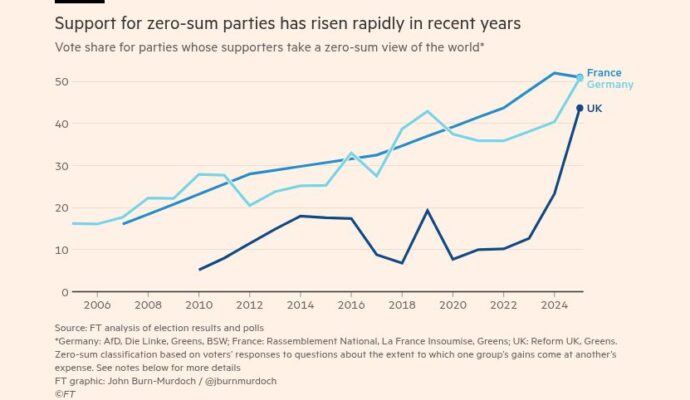Unlock the White House Watch newsletter for free
Your guide to what Trump’s second term means for Washington, business and the world
The Trump administration is drawing up plans to use tariff revenue to fund a programme to support US farmers as they head into harvest facing falling export sales and rising input costs, agriculture secretary Brooke Rollins said.
“There may be circumstances under which we will be very seriously looking to and announcing a package soon,” Rollins told the Financial Times on Wednesday. “We are reviewing markets every day.”
She added that financing the bailout through “tariff income that is now coming into America” was “absolutely a potential.”
The move follows mounting pressure from farm groups after China curbed purchases of new crop US soyabeans and as tariffs have pushed up costs for fertiliser, machinery and other imported inputs. With the soyabean harvest already under way, farmers warn the crisis is deepening.
Rollins blamed trade policies under the Biden administration for the difficulties facing US growers.
“New market access for our American farmers is perhaps unlike any time in history,” she said, adding that the Trump administration is reinstating a vision of “trading America” not seen since Alexander Hamilton at the end of the 19th century.
“Over the last 100 years, we’ve obviously gotten away from that. Under the last administration, President [Joe] Biden and his administration had no new trade deals, and in fact, went from a surplus under President [Donald] Trump for agriculture and everything to a $50bn deficit this year just in our ag products.”
US agrifood exports were the highest ever in dollar terms during Biden’s presidency from 2021 to 2024, according to data from the agriculture department, but the trade balance moved into deficit in 2022 as imports rose faster than exports.
“As our farmers in America move into harvest — and the most beautiful, robust harvest, perhaps on record — what we need to do is ensure that there is a bridge from the Biden set of circumstances we inherited to this new market access, which will really be coming into play next year,” she said.
US soyabean farmers have been hit particularly hard by the trade war with China. Historically, more than half of the soyabeans produced in the US have been sold to the Asian giant.
Trump’s aggressive tariff agenda has targeted Beijing, prompting steep retaliatory duties on US products, including up to 34 per cent on American soyabeans, according to the American Soybean Association. In response to the levies, China has pivoted to Brazil to source soyabeans, which feed the country’s hog herd, the world’s largest.
“We have every confidence in our incredible soyabean farmers in America and the importance of our soyabeans to the world, including to China,” Rollins said.
She stressed that Treasury secretary Scott Bessent, who is leading the negotiations with China, was — as “a row crop farmer” himself — the best person for the job.
“I’m so confident in not only his ability to ensure American farmers are represented but in the president’s ability to ensure a good deal for agriculture.”
Bessent, a former hedge fund manager, owns farmland in North Dakota that produces soyabeans and corn.
Rollins said the Treasury secretary’s conversations with Beijing were ongoing and “hopefully announcements are coming soon”.
In the meantime, US soyabean farmers face a predicament similar to 2019, when the first Trump administration launched a bailout during its trade war with China.
That package, worth $23bn, would now be used as “a foundation to look at what went well, what didn’t”, said Rollins, adding that the administration will need help to pass any new bailout from Congress.


